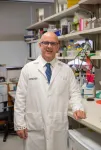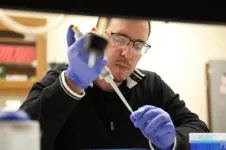(Press-News.org) By Courtney Price, Texas A&M University School of Veterinary Medicine & Biomedical Sciences
Researchers at Texas A&M University have already shown that paternal drinking habits prior to conception can have a negative effect on fetal development — with semen from men who regularly consume alcohol impacting placenta development, fetal alcohol syndrome (FAS)-associated brain and facial defects, and even IVF outcomes.
In an article published this month in Andrology, the lab of Dr. Michael Golding has now demonstrated that it takes much longer than previously believed, longer than a month, for the effects of alcohol consumption to leave the father’s sperm.
“When someone is consuming alcohol on a regular basis and then stops, their body goes through withdrawal, where it has to learn how to operate without the chemical present,” said Golding, a professor in the School of Veterinary Medicine & Biomedical Sciences’ Department of Veterinary Physiology & Pharmacology. “What we discovered is that a father’s sperm are still negatively impacted by drinking even during the withdrawal process, meaning it takes much longer than we previously thought for the sperm to return to normal.”
The Dangers Of Paternal Drinking
One of the major risks associated with alcohol consumption before and during pregnancy is FAS, which causes abnormal facial features, low birth weight and/or height, attention and hyperactivity issues, and poor coordination.
Currently, doctors are required to confirm only that the mother has consumed alcohol — not the father — to diagnose a child with FAS.
“For years, there’s really been no consideration of male alcohol use whatsoever,” Golding said. “Within the last five to eight years, we’ve started to notice that there are certain conditions where there’s a very strong paternal influence when it comes to alcohol exposure and fetal development.
“With this project, we wanted to see how long it would take for the effects of alcohol on sperm to wear off,” he said. “We thought it would be a relatively quick change back to normal, but it wasn’t. The withdrawal process took over a month.”
When drinking alcohol, an individual’s liver experiences oxidative stress, leading the body to overproduce certain chemicals, which then interrupts normal cellular activity. Golding’s team discovered that withdrawal causes the same kind of oxidative stress, effectively lengthening the duration of alcohol’s effects on the body beyond what was previously thought.
“During withdrawal, the liver experiences perpetual oxidative stress and sends a signal throughout the male body,” Golding said. “The reproductive system interprets that signal and says, ‘Oh, we are living in an environment that has a really strong oxidative stressor in it. I need to program the offspring to be able to adapt to that kind of environment.’ But Golding suspects that the adaptations to the sperm aren’t beneficial — they lead to problems like FAS.”
He also noted that it doesn’t take excessive alcohol use for a person to experience withdrawal.
“In the models we’re using, even drinking three to four beers after work several days a week can induce withdrawal when the behavior ceases,” Golding said. “You may not feel inebriated, but your body is going through chemical changes.”
Changing The Narrative
Golding’s work is vital to improving pregnancy outcomes by changing the conversation about who is responsible for alcohol-related birth defects, since society has historically placed all blame on mothers, even when they do not consume alcohol during their pregnancy.
“There’s psychological trauma associated with the question, ‘Did you drink while you were pregnant?’ It’s also difficult for physicians to have that conversation,” he said. “But if they don’t, then FAS doesn’t get diagnosed right away and the child may not get the support that they need until later in life.”
Because of this, it’s crucial that couples planning on getting pregnant know how far in advance to stop drinking in order to prevent birth defects.
While Golding and his lab will continue to research the effects of paternal drinking to help doctors advise couples, he suggests that fathers abstain from alcohol at least three months prior to conceiving, given this groundbreaking discovery.
“There’s still a lot of work to be done to get a hard answer, but we know that sperm are made over the course of 60 days, and the withdrawal process takes at least one month,” he said. “So, my estimate would be to wait at least three months.”
END
Texas A&M researcher says men should abstain from drinking at least three months prior to conceiving
In examining the effects of paternal alcohol consumption on fetal alcohol syndrome, a groundbreaking new study reveals that it can take over a month for negative alcohol effects to wear off.
2023-12-13
ELSE PRESS RELEASES FROM THIS DATE:
CUNY SPH partners with UNFPA on campaign to end gender-based violence
2023-12-13
New York, NY | December 13, 2023 – The CUNY Graduate School of Public Health and Health Policy (CUNY SPH) has partnered with the United Nations Population Fund (UNFPA) on the 16 Days of Activism against Gender-Based Violence campaign, an initiative to bring global awareness to the widespread issue of gender-based violence, a pervasive public health threat.
The 16 Days campaign was launched in 1991 at the first Women’s Global Leadership Institute held by the Center for Global Women’s Leadership (CGWL), with the goal of raising awareness ...
The A+ team tackles AI and quantum computing hardware
2023-12-13
NEWPORT NEWS, VA – Superconducting technologies are the lifeblood of the U.S. Department of Energy’s Thomas Jefferson National Accelerator Facility in its ongoing mission to probe the quarks and gluons inhabiting the quantum universe.
Superconducting radiofrequency (SRF) technology, a core competency of Jefferson Lab, is used to accelerate the fundamental electron particles in the lab’s Continuous Electron Beam Accelerator Facility, enabling researchers from around the world to conduct cutting-edge experiments to study the fundamental building blocks of matter. With the investment from DOE’s Office ...
Can telehealth assessments identify infants more likely to be on the autism spectrum?
2023-12-13
Is it possible to identify infants more likely to be on the autism spectrum through telehealth assessments? The UC Davis MIND Institute’s Meagan Talbott, a professional researcher in the Department of Psychiatry and Behavioral Sciences, has received a $3.2 million grant to seek the answer to that question. The five-year grant is from the National Institute of Child Health and Human Development.
Talbott is now recruiting for a national study of 120 infants, 6-12 months of age, who are showing delays or differences in their development. Parents might have questions about autism or other conditions, but ...
Virginia Tech researcher probes the potential for preventing and reversing age-related memory loss
2023-12-13
About 40 percent of people over age 65 suffer some form of age-related memory loss, which puts them at higher risk for developing dementia and Alzheimer’s disease. However, there are currently no approved methods for preventing memory loss with age.
Tim Jarome, associate professor of neurobiology in the Virginia Tech College of Agriculture and Life Sciences’ School of Animal Sciences is hoping to change that, aided by a $433,000 grant from the National Institute on Aging, which is part of the National Institutes of Health.
Jarome and his research partner, Assistant Professor Sydney Trask of Purdue University’s Department ...
Mpox (monkeypox) vaccine triggers equally strong immune response in smaller than usual doses and in people with or without HIV
2023-12-13
Delivering the two-dose mpox vaccine, called JYNNEOS, in smaller than the usual FDA-approved doses, and by injection between layers of the skin rather than by the standard route under the skin, produced a detectable immune response, a new study shows. This also occurred regardless of whether people were living with or without HIV.
Led by researchers at NYU Grossman School of Medicine, the study showed no significant difference in the strength of the immune response (as gauged by the amount of detectable IgG antibodies, immune proteins that help kill the mpox virus) between most of those who received their vaccine injections in small doses ...
Interactive screen use reduces sleep time in kids, researchers find
2023-12-13
UNIVERSITY PARK, Pa. — While screen time is generally known to affect sleep, new research suggests that interactive engagement, such as texting friends or playing video games, delays and reduces the time spent asleep to a greater extent than passive screen time, like watching television — especially for teens.
The research, which published today (Dec. 13) in the Journal of Adolescent Health, demonstrates that adolescents at age 15 who used screens to communicate with friends or play video games in the hour before bed took 30 minutes longer to fall asleep than if they had refrained from interactive screen time. But it wasn’t just interactive screen time ...
New study shows exercise can boost brain health
2023-12-13
Santa Monica, Calif. (Dec. 12, 2023) – A fascinating link between regular exercise and better brain health has been revealed, according to an international study that included a team of clinical researchers from Pacific Neuroscience Institute’s Brain Health Center, located at Providence Saint John’s Health Center.
The research, detailed in the paper "Exercise-Related Physical Activity Relates to Brain Volumes in 10,125 Individuals," was published this week in the Journal of Alzheimer’s Disease and shows being physically active is related to increased size of brain areas important ...
UNC researchers reveal prevalence of persistent symptoms in patients with microscopic colitis
2023-12-13
It’s a hidden cause of diarrhea and the development of the disease is poorly understood. Multiple factors work against the diagnosis of microscopic colitis, an inflammatory digestive disease, because the symptom distress compared to patients with other causes of chronic diarrhea remains unknown. Now, a new study published in journal Gastro Hep Advances, shows patients may be unsure of a diagnosis based on their colonoscopy results, patients may not be prescribed the proper medications, and many patients may remain symptomatic one year after colonoscopy.
The ...
Don't say vegan: Americans more likely to choose vegan food if labeled ‘healthy’ and ‘sustainable’
2023-12-13
There may be a simple way to convince meat eaters to consume vegan food, according to a new USC study: Don’t call the food “vegan.”
Americans were far less likely to choose a gourmet gift basket without meat or dairy if it was labeled “vegan” or “plant-based,” according to a nationally representative survey of more than 7,500 U.S. adults. By contrast, labeling the basket “healthy” and/or “sustainable” roughly doubled the likelihood that Americans ...
UTA’s Woods and Weidanz named to NAI
2023-12-13
The National Academy of Inventors (NAI) has elected Jon Weidanz and Robert Woods, two professors from The University of Texas at Arlington, as fellows.
Weidanz is vice president for research and innovation and holds research positions in bioengineering and kinesiology. He also is a member of the Bone and Muscle Research Center and the Multi-Professional Center for Health Informatics at UTA.
Woods is a professor of mechanical and aerospace engineering, the advisor of the Formula Society of Automotive Engineering (FSAE) student racing team and the holder of the Dr. Bob Woods Chair in Automotive Engineering Endowed by Paul Andrews ...
LAST 30 PRESS RELEASES:
Scientists discover why we know when to stop scratching an itch
A hidden reason inner ear cells die – and what it means for preventing hearing loss
Researchers discover how tuberculosis bacteria use a “stealth” mechanism to evade the immune system
New microscopy technique lets scientists see cells in unprecedented detail and color
Sometimes less is more: Scientists rethink how to pack medicine into tiny delivery capsules
Scientists build low-cost microscope to study living cells in zero gravity
The Biophysical Journal names Denis V. Titov the 2025 Paper of the Year-Early Career Investigator awardee
Scientists show how your body senses cold—and why menthol feels cool
Scientists deliver new molecule for getting DNA into cells
Study reveals insights about brain regions linked to OCD, informing potential treatments
Does ocean saltiness influence El Niño?
2026 Young Investigators: ONR celebrates new talent tackling warfighter challenges
Genetics help explain who gets the ‘telltale tingle’ from music, art and literature
Many Americans misunderstand medical aid in dying laws
Researchers publish landmark infectious disease study in ‘Science’
New NSF award supports innovative role-playing game approach to strengthening research security in academia
Kumar named to ACMA Emerging Leaders Program for 2026
AI language models could transform aquatic environmental risk assessment
New isotope tools reveal hidden pathways reshaping the global nitrogen cycle
Study reveals how antibiotic structure controls removal from water using biochar
Why chronic pain lasts longer in women: Immune cells offer clues
Toxic exposure creates epigenetic disease risk over 20 generations
More time spent on social media linked to steroid use intentions among boys and men
New study suggests a “kick it while it’s down” approach to cancer treatment could improve cure rates
Milken Institute, Ann Theodore Foundation launch new grant to support clinical trial for potential sarcoidosis treatment
New strategies boost effectiveness of CAR-NK therapy against cancer
Study: Adolescent cannabis use linked to doubling risk of psychotic and bipolar disorders
Invisible harms: drug-related deaths spike after hurricanes and tropical storms
Adolescent cannabis use and risk of psychotic, bipolar, depressive, and anxiety disorders
Anxiety, depression, and care barriers in adults with intellectual and developmental disabilities
[Press-News.org] Texas A&M researcher says men should abstain from drinking at least three months prior to conceivingIn examining the effects of paternal alcohol consumption on fetal alcohol syndrome, a groundbreaking new study reveals that it can take over a month for negative alcohol effects to wear off.





